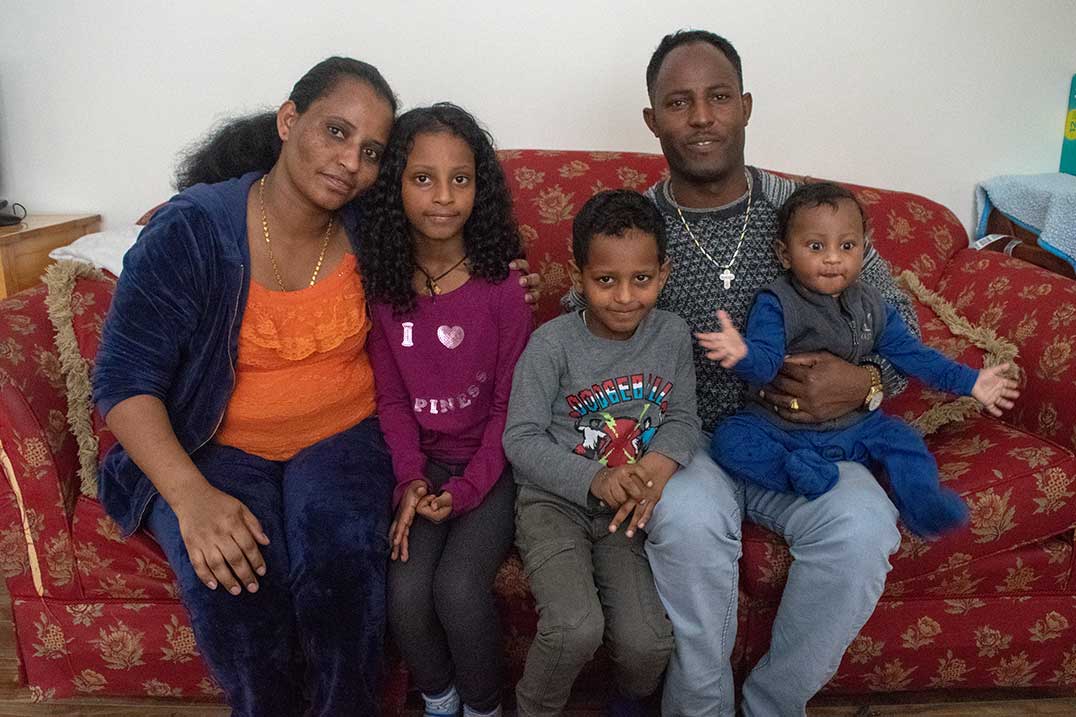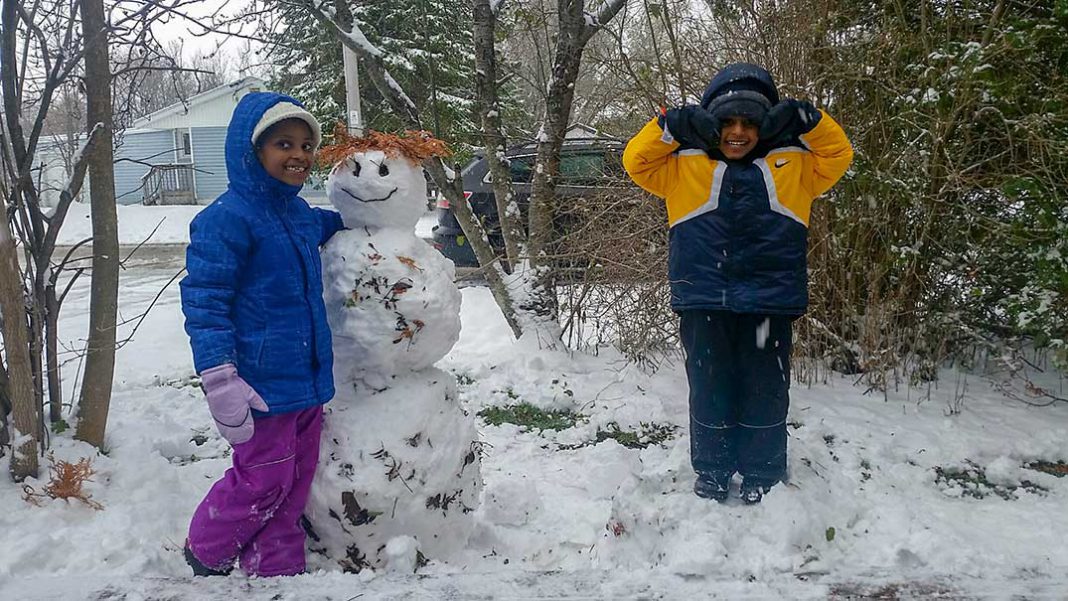Little Current family happy in new home
LITTLE CURRENT—Ontario’s frequent snowstorms this season have caused nuisances for drivers and meant hours of backbreaking shoveling on driveways across the province. But for one Island family, the snow signifies something they have not known for a long time—freedom.
“We’re really happy we have now found a place we can call home,” Berhe Hile Beyene tells The Expositor through a translator on the phone from Toronto. He and his wife had been living in Israel for the past 10 years as refugees and finally made it to Canada where they joined some of their family.
Mr. Hile Beyene and his family arrived on Manitoulin Island on November 7 and almost immediately had to contend with frigid temperatures much below seasonal, with wind chill values down into the negative mid-20s.
“It’s what we expected, we knew what Canada was like in the winter,” says Mr. Hile Beyene, who jokingly says he feels sorry for Canadian children given how cold the weather can get. “We can’t say we like it, but that’s what we expected at least.”
There are five people in Mr. Hile Beyene’s family that live in Little Current; his 11-year-old son has been living with his grandparents in Burnaby, B.C. for a couple of years. Mr. Hile Beyene’s wife Letbrhan Kesete Gebra helps to raise their three other children, Betelhem, age seven, Natnal, age four and seven-month-old Ruphael.
Their journey from their origins in Eritrea to Canada took many years and involved considerable hardships and setbacks along the way.
“The main problem was the uncertainty. We were unable to know what would happen next,” says Mr. Hile Beyene.
In June of 2015, the United Nations Commission of Inquiry on Human Rights in Eritrea released a report that discussed troubling conditions in the country, including a history of torture, sexual abuse, indefinite military service and extensive surveillance to keep its citizens ‘under control.’ Its prison system is believed to contain some estimated tens of thousands of political prisoners.
The UN estimates that in 2014, 357,406 Eritreans—the equivalent of between six and 10 percent of the country’s population— were living as refugees in foreign countries. Several cases surfaced of refugees dying or being kidnapped for try, ing to escape the country, and there are reports of refugees being killed before they could exit Eritrea. A shoot-to-kill policy exists at certain border crossings to prevent residents from leaving the country, which is a violation of the fundamental human right to life.
“Any young person in Eritrea, by age 17 or 18 they have to go through military training. Once they are there, they have to stay in the military indefinitely,” says Mr. Hile Beyene. This was especially prevalent after the war when Ethiopians occupied part of Eritrea.
Mr. Hile Beyene was conscripted into the military but fled to an Ethiopian refugee camp. From there, he went to Sudan.
“In Sudan, there are a lot of Eritrean agents within the country that will take them back to Eritrea without the government’s knowledge. They’re basically kidnapped,” says Mr. Hile Beyene.
He managed to avoid that fate and found a smuggler that took him to Egypt.
“We walked across the Sinai Desert for about five to six hours. That was probably the toughest part,” Mr. Hile Beyene says.
After travelling such a great and perilous distance, they settled in Israel where they would live for the next 10 years. However, Israel did not prove to be a very welcoming home for these Eritrean refugees.
“We could not apply for refugee status, so the only work I could get was underground. We got 20 to 30 percent less pay than we should have. They really take advantage of refugees,” says Mr. Hile Beyene.
The discrimination even existed in the schoolyard for his children.
“Our kids, when they would go to school, had problems with racism. When they came back home, they would talk about being of a different colour and having dark skin,” he says.
Lianne Hovingh is one of the people who has helped sponsor and support the family. She says she has enjoyed being alongside the family for their journey to a better life.
“People don’t realize how bad it is in Israel for refugees,” she says, adding that Israel allegedly paid Uganda in exchange for taking its Eritrean refugees.
“They’re transitioning pretty well. It is different because they are more Westernized than some of the other groups, so things are not so strange,” says Ms. Hovingh.
Mr. Hile Beyene’s parents came to Manitowaning in February of 2016. Since their arrival, they had been working on bringing their son to Canada as well. That family settled in Manitowaning but has since moved to Burnaby, B.C., where an estimated 2,000 Eritreans reside, according to Ms. Hovingh.
When Mr. Hile Beyene and his family arrived, the kitchen was fully stocked and the house had ample amounts of furniture. Ms. Hovingh says churches and volunteers across Manitoulin all contributed to getting the family settled, including the online discussion group Resilient Manitoulin, from where the co-ordinators received several donations for the family.
“We were welcomed by everyone, people received us and shared very good hospitality and treatment,” says Mr. Hile Beyene. He says the best part of living in Canada is being able to raise his children the way he wants.
The hardships for the extended family are far from over. Ms. Kesete Gebra’s mother and brother are still in Eritrea and she has a number of relatives dispersed in other countries. Her father is missing; nobody has any ideas as to his whereabouts.
The couple has not seen their now-11-year-old son for a full decade; he left for Canada with his grandparents when he was just eight months old.
“We are trying to arrange a trip to get them to see their family soon in British Columbia,” says Ms. Hovingh.
Now that their first month in Canada has passed, the family says they are extremely grateful for the help and support they have received.
Ms. Hovingh adds her thanks to everyone on the Island who has given donations and otherwise supported the family.
“Don’t be shy to say hello to our new neighbours in town,” she says.

photo by Warren Schlote




